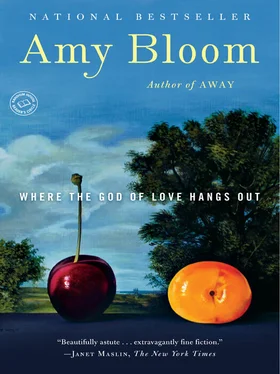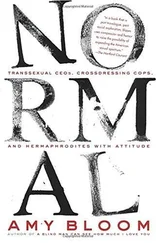I rang the doorbell and my father let me in. Aside from needing a haircut, he looked good. The house did not. And it smelled the way it had forty years ago, when our whole family sat on the kitchen porch and watched Long Island Sound rise past the pear tree and onto the driveway and then into the TV room, which had never really recovered.
“Better late than never,” he said. “The girl left a note for you.”
The note said, as I knew it would, that Delphine found herself too busy to clean for my father, and it was her distinct impression that he actually needed more than a cleaning person since, as she wrote in her neat, curvy handwriting, there was an exceptional amount of filth and personal uncleanliness accumulating from week to week (she itemized the most offensive occurrences at the bottom of the page). She was happy to recommend Beate Jaszulski, a Polish person who had been a nurse in Poland and whom she had met at adult education. She left me Beate’s number. My father and I ate the only things in the refrigerator, hard-boiled eggs and American cheese, and he asked why Andy hadn’t come. I said Andy was very busy, and my father snorted.
“Busy sucking some guy’s cock,” my father said.
“You know,” I said conversationally, “we try to be nice to you. We try to be nice, which isn’t easy because you are an emotional black hole and the coldest, most self-centered sonofabitch I have ever known, we try to be nice in honor of our mother’s memory. So, if you can’t be civil, why don’t you just shut the fuck up?”
My father took his slice of cheese into the living room and read until he heard me go to bed.
In the morning, I showered with my mother’s Arpège bath soap and used her antique hair dryer and got dressed and started again. I suggested that it might be wise to sell the house and move into assisted living. Near me, I even said.
“The only way I’m leaving this house is feetfirst,” he said.
I have to say, I did laugh and I did say, “That’s not a problem.” Oh, we should have smothered him the night after my mother died, we should have just snuck into their bedroom, pulled back that Venetian damask duvet cover she was so proud of, put the matching pillows over his face, and leaned in until he stopped moving.
“Look,” I said, “You can sell the house and move into assisted living or you can keep the house and hire someone to care for you — a housekeeper-type person — and you do that for as long as you can afford it, and then your backup plan is you die before you run out of money.”
“Fine,” my father said. “Hire someone. A nice pair of tits wouldn’t hurt.”
Beate Jaszulski moved into my old room. My father handed her the car keys. (What do I need the hassle for? People drive like goddamn idiots around here anyway.) And every Friday, she dropped him off at the five o’clock movie, while she did the grocery shopping. She kept the house clean, he said (You can eat off the goddamn floor) and cooked the meals he preferred (Just plain food, he said, no French song and dance). Two boiled eggs and dry rye toast every morning, a grilled cheese sandwich every day for lunch, and two broiled lamb chops and rice for dinner, or sometimes, caution to the winds, she cooked a small rib eye with a side of mashed potatoes. I know this because I spoke to Beate every Sunday and she would recite the meals cooked, the walks taken, the minor household repairs her cousin Janek performed and she billed us for. She never complained about my father and she never criticized me for not visiting. At the end of every conversation, I’d ask to speak with my father, and she’d say, “Sure. Sure, you want to talk to Dad,” sympathetically, as if she understood that I was so eager to talk to him, I just couldn’t stand another moment of chitchat.
“Alvin,” I said.
“Alison.”
“How’s it going?”
“Can’t complain.”
“Okay. Good. Everything good with Beate?” What did I think? She would rob him and he would know and report it to me, in due time? She would, at not quite five feet tall and as big around, and sixty-five if she was a day, hurt him or seduce him?
“It’s okay.” Sometimes he would tell me that Beate listened to the radio too loud or used too much ammonia on the kitchen floor or he’d found the lamb a little tough, and I would mention these things to her very delicately and she’d say, “I take care of it.” No complaint was ever repeated. Andy referred to her as Mother Beate and he made a lot of jokes about the number of old men she had buried and their grateful children. (“That’s how she got that Porsche and that house in Cap-Ferrat,” he said. “God bless her.”)
After about a year with Beate:
“Alvin,” I said.
“Alison. Alibaloo.”
“Dad? Are you all right?”
“Never better. Bea — how am I?”
I heard Beate talking in the background and my father chuckled and he said, “There you go. I’m — how old am I, Bea? — there you go, I’m eighty-eight and holding my own. No pun intended.”
Beate got on the phone and told me that her own mother was dying in Poland and she had to fly home.
“Just for a week. I be back for Mr. Lovald. I go on a Saturday, I be back on a Sunday.”
I asked if Beate had any thoughts about who would keep my father company, make his meals, drive him on his errands, do his laundry. “Forget the laundry,” I said. “It can pile up for a week. Who will do the other things,” I asked Beate, and there was a long, flat Polish silence.
“Fine,” I said. “I’ll be there Saturday and we can do the … handoff.”
Beate understood well enough what I meant and her voice brightened as we went back to her plans, which included dry-cleaning her raincoat, buying a pair of good boots, laying in a supply of frozen lamb chops and clean boxers for my father for a week, and bringing peanut butter to Ruda Slaska.
“Janek will take me to airport,” she said. “Newark.”
My cab pulled up in front of the house at four o’clock. Beate showed me the eggs, the sliced American cheese, the rye bread, and the fourteen frozen lamb chops. She handed me the keys. She gestured toward my parents’ bedroom.
“He naps,” she said. “I see him Sunday. Seven days.” She held up seven fingers and then she picked up her suitcase and waved good-bye. As she stepped onto the porch, a car appeared, and my guess was that her cousin had parked up the street and was just waiting for my cab to leave.
Beate was out the door, and it would be just me and Alvin for the next seven days, unless I killed him, in which case I would spend at least half the week in jail. The house looked, somehow, more like my childhood home than it had for the last twenty years. Beate had found my mother’s old spring slipcovers and covered the cigar-burned navy couch with pink and yellow chintz and she’d even found the yellow chintz pillows and the yellow-and-white-striped slipcover that went on my father’s armchair. It was all aggressively and hopelessly cheerful, and I expected my mother to walk out of the kitchen, wiping her hands on a clean apron, and saying either, “Who wants quiche?” which was a good day or, “There’s no reason to upset him,” which was not.
“Bea? Bea?” My father was yelling, pretty loudly.
I opened the door a crack. I had no wish to be in my parents’ bedroom with my father, where he still slept on his side of the bed and where there was still, on my mother’s nightstand, a box of tissues and a paperback.
“It’s me, Dad. It’s Alison. Beate’ll be back in a week. I’m here in the meantime.”
“What?” he said and he sat up, patting his nightstand all over for his glasses, which were lying on the floor. I handed him his glasses.
“Thank you. You’re a good kid,” he said.
Читать дальше












